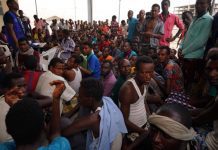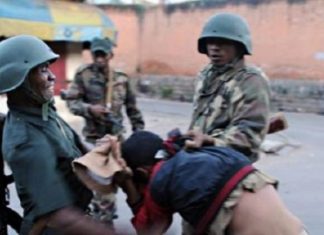Only a few days ago, Mali’s military strongman, Colonel Assimi Goita, again, overthrew the months’ old transitional government which only began trying to reorganise the country, setting a pace for the return of democratic rule. How can Pro-Russians and Pro-French, form a successful transition together? In Mali, the former president of the transition Bah N’ Daw and his prime minister Moctar Ouane are pro-French and the other side the military are backed by Russia.
Since Ibrahim Boubacar Keita’s departure it had been understood that the military who took power, are more aligned to Russia than France, but because of international pressure, these soldiers gave in but they were still working in secretly with Russia which continued to infuriate France.
France does not allow her colonies purchase ammunition from foreign countries without her permission. Also, it remains difficult for those countries to seek foreign aid without the knowledge and approval of France.
The Accord
As part of the bargain for self-rule, France instituted a system that makes their colonies perpetual slaves of France especially with the 11 Agreement signed in the wake of African Independence.
1. Colonial debt for repayment of the profits of colonization.
That is, the newly independent states must reimburse the cost of infrastructures built by France during settlement.
2. Automatic confiscation of national financial reserves.
That is, African countries must deposit their financial reserves with the Banque de France. France’s ′′ keeping ′′ the financial reserves of fourteen African countries since 1961: Benin, Burkina Faso, Guinea Bissau, Côte d’Ivoire, Mali, Niger, Senegal, Togo, Cameroon, the Central African Republic, Chad, Congo-Brazzaville, Equatorial Guinea and Gabon.
Thus, monetary policy governance remains asynchronous and incomplete because they are driven directly by the French government, unrelated to the financial authorities of countries such as CEMAC or ECOWAS.
Thus, due to the conditions that bind banks in economic and financial zones, they are forced to keep 65 % of their foreign reserves in a transaction account held by the French Treasury, as well as an additional 20 % in order to cover ′′financial risks”.
In addition, banks in CFA zones impose a credit limit on each member country equivalent to 20 % of state receipts for the year N-1! Although the BEAC or the ECBAO have higher retirement opportunities from the French Treasury, these withdrawals must be the subject of the French Treasury agreement.
The final decision therefore goes to the French Treasury which itself invested the reserves of African countries in the Parisian stock market.
In other words, 80 % of African financial reserves, are deposited into an account controlled by the French administration.
3. The right of first refusal to any raw or natural resource discovered in the country.
That is France has the first right to buy the natural resources of the land of its former colonies. Only after France said, ′′ I am not interested “, that African countries are allowed to look for other partners.
4. Priority to French interests and companies in public contracts and tenders.
In awarding public contracts, French companies have priority over award. Although African countries can get better value elsewhere.
Consequently, in most former French colonies, all economic levers in countries are in the hands of French expatriates. In Côte d’Ivoire, for example, French companies own and control all major utilities including water, electricity, telephone, transport, ports and major banks. It’s the same thing in trade, construction and agriculture.
5. Exclusive right to provide military equipment and train colonial military officers.
Thanks to a sophisticated system of scholarships, subsidies, and the ′′defence agreements′′ attached to the colonial pact, Africans must send their senior officers to France.
6. France’s right to deploy troops and intervene militarily in the country to defend its interests.
Under what is called ′′defence agreements′′ attached to the colonial pact, France has the right to intervene militarily in African countries, and also to permanently park troops in military bases and installations, fully managed by the Frenchman.
7. The obligation to make French the official language of the country and the language for education.
An organization of the French language and the spread of French culture has even been created. It is called La Francophonie and has several satellite organizations. These organizations are affiliated and controlled by the French Foreign Minister.
8. The obligation to use the CFA franc (franc of the French colonies of Africa).
Although this system is not shared by the European Union, the French colonies are forced to use exclusively FCFA.
9. The obligation to send to France an annual balance sheet and a state report of reserves.
No report no money:
i.e. the director of central banks of ex-colonies presents the said report at the biannual meetings of finance ministers on ex-colonies. This report is then compiled by the Banque de France and the French Treasury.
10. Forfeit any military alliance with other countries, unless France has authorized it.
Most of these countries only have military alliances with their ex-colonizers simply because France prohibited them from any other military alliance.
11. The obligation to join forces with France in the event of a war or a global crisis.
More than a million African soldiers fought for the defeat of Nazism and fascism during the Second World War. These eleven (11) agreements are still in effect between France and the 14 CFA countries, and no French media or their so-called African specialists will talk to you about these eleven agreements that are still in force between France and the 14 CFA countries, and yet these agreements do exist between France and the CFA zone.
Today there seem to be a depart from this accord as many of the francophone countries have on their own in spite of the consequences began to form new alliances coupled with a growing sense of independence amongst the populace.
In Rwanda for instance, President Paul Kagame recently asked President Putin for more energy deals, arms sales and slots for college students in Russian schools. Other states, like Sudan, have also explicitly combined appeals for what Russia calls “military-technical cooperation” – that is, arms sales and support for Russian air and/or naval bases in their countries. South Africa has very close relations with Russia through common membership in the BRICS group. Russian diplomats now eagerly travel around Africa to advance their brand.
Many years after the collapse of the Soviet Union following the cold war, Russia has returned to Africa and using all of its instruments of power, including diplomacy, energy investments, and scholarships to Russian universities for African students.
Although not so visibly active politically, but Its presence can be felt mostly through “private” institutions that are really controlled by the state. One such entity, a private military company (PMC) called the Wagner Group, has been deployed to the Central African Republic to support that country’s government against local insurgents and yielding positive results.
Associate Professor Simeon Olayiwola agrees that the role of France in the entire Francophone Africa has been exploitative in nature hence the incursion of Russia checkmating these excesses. On her own part, Russia has been playing the role of liberation agent for those African countries. All along, France has put in place a mechanism that subjects African leaders (in the Francophone Africa) to the whims and caprices of France. The more reason any leader who dares make any change contrary to French interest is removed at all cost.
“Russia on her own part assumes the front burner in trying to free those countries. This is what Russia has been doing right from the era of cold war (after the second World War) since France has not in any way justified her presence in Africa especially with the rate of development in the Francophone Africa. France has been accused of playing negative roles – From the Rwandan genocide to the Boko Haram/ISWAP insurgency in the Sahel. Worthy of mention is the fact that France has blocked and still blocking military alliance of Francophone African countries with foreign powers which is why like many other francophone countries, Mali is in crisis today.
“Those who took over power in Mali had the support of Russia. They took over power from the leaders who had the backing of France. That’s the reason for the present political imbroglio in Mali. Aside from Benin republic and Senegal, all other Francophone African countries have never had it smooth. From Togo to Burkina Faso, passing by Côte-d’Ivoire, Mali, Niger, Chad up to Cameroon, the story is the same.
“Russia’s involvement in Africa is a good step in the right direction. What have they gained from their allegiance to France? Nothing. So, drifting away from Paris, in my own view is one of the best ways to achieve greatness.
“France played a prominent role in the fall of Ghadafi and eventually that of Libya. Right from the late 1960, France has never played a good role. At the wake of the Biafran war in Nigeria that led millions to their graves, coupled with starvation, General Charles de Gaulle made a declaration that Nigeria was too big and it was necessary to have the country divided. It is on record how the French mercenaries fought on the side of Biafra then. And when Biafran war was about to end, its leader had to seek asylum in one of the Francophone countries- Côte d’Ivoire. Gabon too was like the clearing house and the Fortress for Biafra back then. Those are the roles France plays in Africa. Presently, a lot of anomalies have been attributed to France as regards the activities of Boko Haram and ISWAP.” He added.
Many have argued that Russia may have an ulterior motive, but it is more about liberating countries under the strong hold of France, especially although there’s no free gift in the world of diplomacy. Like they say in French language, “tout ce qui est gratuit n’est pas sérieux”. There would surely be some implications either in form of Russia making more money or having more powers in the world. However, on the long run, it’s a win win for African countries considering the role France has been playing in the continent.
Join Television Nigerian Whatsapp Now
Join Television Nigerian Facebook Now
Join Television Nigerian Twitter Now
Join Television Nigerian YouTUbe Now





